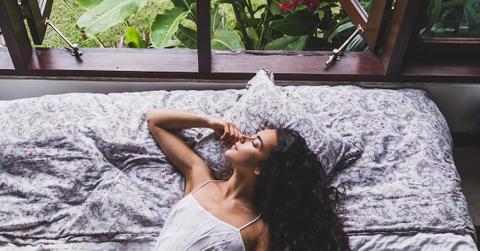A Sleep Doctor Tells Us How To Sleep Through The Summer Without AC
Dr. Jocelyn Cheng at NYU Langone offers low-tech solutions to beating the heat.
May 17 2019, Updated 12:57 p.m. ET

Trying to fall asleep on a blistering hot summer night is a process. You toss, you turn, you flip your pillow for what feels like the twelfth time. But still, you can't drift off. The whole thing would end in tears, if you weren't so dehydrated. So you just keep sweating (how are you still sweating?) in silence.
But you can make it through the summer heat without losing sleep — and you don't need to crank your air conditioner to do it. To prove it, we called in the pros. Dr. Jocelyn Cheng is a neurologist at NYU Langone Health who specializes in sleep medicine. She explained why it's so tough to stay rested in the summer, and offered some low-tech solutions to get you on a regular REM cycle. Check out her energy efficient advice below.
The following Q&A has been edited for clarity, flow, and length.
Why do people have such a hard time sleeping through summer nights? Is there a scientific reason?
So our body normally goes through something called circadian rhythm, which is basically when biological rhythms follow a distinct pattern throughout the course of the day. Circadian rhythm in normal individuals will give you the propensity to stay awake during the daytime hours and towards the evening, that’s when you get sleepy. There are other portions of your metabolism that are involved in circadian rhythm and one of those is temperature. So at night, as our body has this inclination to go to sleep, there’s also a relative decrease in our body temperature. When you’re overheated, it interferes with that circadian process. So that does make it more difficult to sleep.

If someone is trying to improve their sleep schedule during the summer but they’re also trying to cut down on their AC use, what can they do?
So if you’re able to, sleeping on lower floors is helpful because heat rises. When I grew up, we had a basement family room, and upstairs was where the bedrooms were. It was significantly cooler and easier to sleep in the basement area. So that’s something that can be easily done, if you have that sort of living situation.
Fans can be low energy. If you’re able to create some sort of cross-pressure differential for creating a breeze. So you know, opening windows and doors to get a breeze to go through the areas in which you’re sleeping. Keeping hydrated, because you do tend to sweat a lot and that can interfere with your ability to cool off. And then some people, though this might sound uncomfortable, would use damp bedsheets or a damp cloth to cover their face or their head, somewhere in their upper body, to try to cool off. Again, that’s because that water is evaporating and then that evaporation is associated with a decrease in your temperature. So all these things can be helpful.

What kind of habits should they avoid? Is there anything that makes the situation even worse?
If they have a bed partner, then cuddling with your bed partner, this is not a great time to do it. Because another body is definitely going to make stuff worse. There’s certain common sense stuff, like if you’re wearing pajamas at night, maybe don’t or wear as sparse as you can [laughs]. Just light clothes. Everyone sleeps on a mattress, but mattresses, no matter what you cover them in, have this tendency, because they’re cushioning your body, to retain heat. So for instance, if you’re sleeping on a tatami mat, sort of in the more eastern tradition, then you’ll probably end up being cooler, because it’s more breathable.
And when should someone see you? How can they tell that they’re not just struggling with the heat, but have a larger sleep problem?
Excessive daytime sleepiness is one of the most common problems. That’s assuming that you feel like you had a good night’s sleep, but then you wake up and you’re just really tired. That can be for multiple reasons. The most common in adults is something called obstructive sleep apnea and if you have something like that, then you might have other common symptoms like snoring or in some cases, if it’s really severe, people’s bed partners or other witnesses will have actually seen the person stop breathing during their sleep. And of course, you’re not aware of it. There’s lots of other causes for having poor disruptive sleep. Some people can have parasomnia, which is basically undesirable behaviors that occur during your sleep that you’re not aware of. So for instance, sleepwalking. People might wake up finding objects in different places or wake up finding themselves in a different area.

Is there any other advice you’d give someone who’s looking to improve their sleep schedule?
I know we all have a tendency to stay out late on the weekends and then you don’t go to sleep until later, and you sleep in. You’re only doing that two days a week and the other five, you’re at your regular work schedule. That alone can really throw off your body's clock. So it’s important to maintain a routine sleep schedule, if you can. That’s one of the first things, and also one of the most common problems for a lot of people because it takes a lot of self-discipline [laughs].